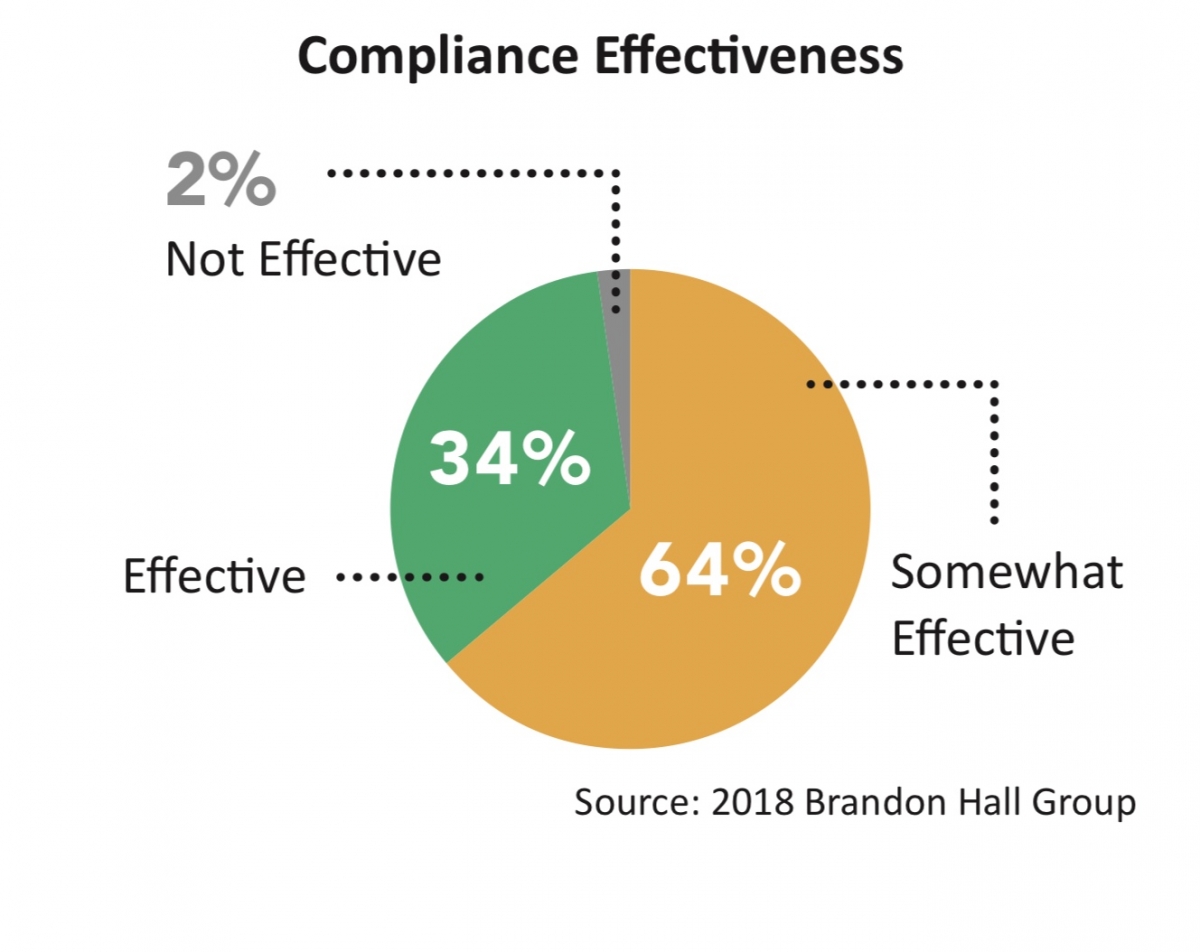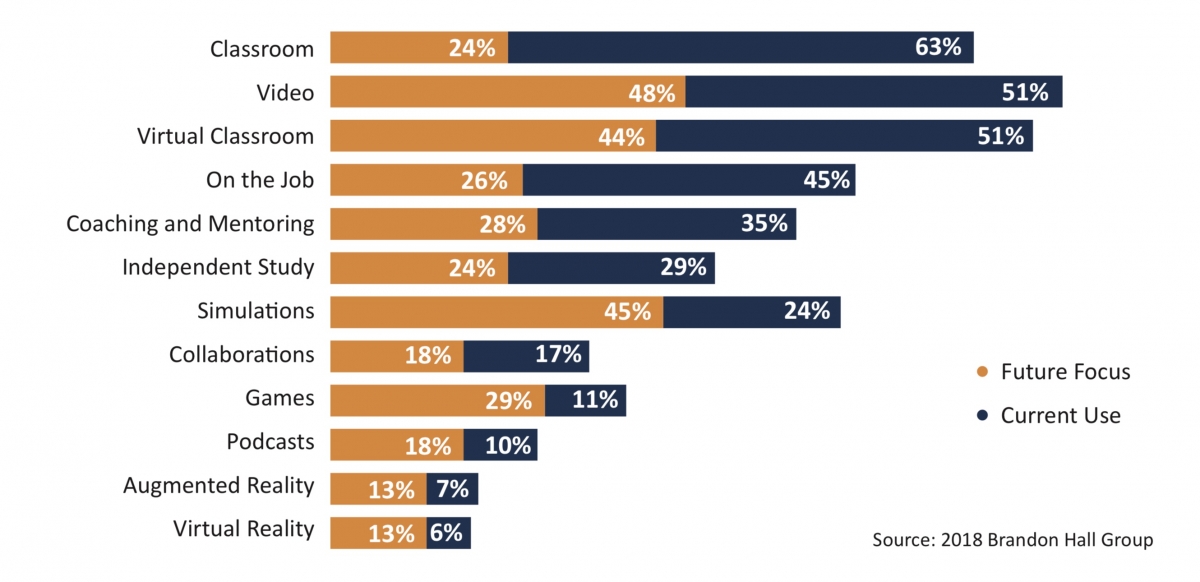Compliance affects just about every organization, regardless of size, industry, or geography; and it ranges from something as simple as an employee handbook to complex legal and financial regulations. Because of this, more than half of companies in Brandon Hall Group’s 2018 Learning Strategy Study identify compliance training as a high priority for Learning & Development, more than even job-specific skills or leadership development.
Compliance Requires Investment
Because of its high-priority status, companies can find themselves spending a lot of money to deliver compliance training. While 43 percent of organizations spend less than $500 per employee per year, another 40 percent spend more than $1,000, with 15 percent spending more than $5,000 annually per employee.
Compliance Takes Time
As companies shift to a more dynamic, continuous learning model in most other areas, compliance training remains a static, event-driven undertaking. More than 40 percent of companies say employees engage in compliance training annually. Few companies are delivering compliance training on a more regular basis, which would help make it part of an employee’s overall learning/work experience. In addition, more than half of companies say their employees are spending more than 10 hours per year in some sort of compliance training. Organizations should strive to make that time just as relatable and engaging as all of the other learning that is being delivered.
Compliance Challenges
Despite the recognition of compliance training’s importance and the resources dedicated to delivering it, most organizations still tend to think of compliance as a necessary evil or a “check-the-box” exercise. With regard to design and delivery, compliance gets nowhere near the attention leadership development does, despite being a higher priority. Companies need to treat compliance training as the priority it is.
The challenge is that with other forms of learning, we see results and impact when it is done well. With compliance, we only see the impact when it is done poorly. Being out of compliance can lead to fines, lawsuits, accidents, and business slowdowns. However, if compliance training is done right, the results are essentially invisible.
Compliance Opportunities
Not only is compliance training a high priority, it is typically the first learning experience an employee has with an organization. It is also the one type of training that will impact the most employees, and time spent in compliance training often is mandated. This should be driving organizations to create new, better, more impactful compliance training experiences, rather than relying on outdated, unengaging content and courses.
Overall Compliance Effectiveness
Despite its scope and importance, organizations are not getting the return on their investment in compliance training they should. Only 34 percent of companies report that their compliance training efforts are effective. When it comes to compliance, “somewhat effective” is essentially the same as “not effective.” In other words, two-thirds of companies are falling short of their compliance training expectations. And while other forms of training may have similar effectiveness results, the outcomes are much more serious for compliance. This evidenced by the fact that only 40 percent of companies say they currently are fully prepared for a compliance audit. It’s arguable that if a company is not fully prepared, it is not prepared at all. When it comes to an audit, a company is either compliant or not. There is no gray area.
When we look at the effectiveness of compliance training, it is clear those companies that consider their efforts effective are nearly three times more likely to say they are fully prepared for an audit.

Compliance Systems
Making matters more challenging is the fact that approximately one-quarter of all compliance training is still managed manually. That means spreadsheets, intranet sites—even paper and pencil. It also means headaches when it comes to demonstrating compliance. It can be difficult to pull together data stored in various analog formats and make sure everything matches up. As organizations move further along their digital transformation, compliance training has even further to go.
While companies employ a wide variety of modalities for compliance training, in-person instructor-led training is the most common, used by nearly two-thirds of companies. Other common modalities include videos, virtual classrooms, and on-the job training. As we move into the future, however, organizations do not generally plan to use more of these methods. For example, only 25 percent of companies say they plan to use more ILT in the future, and 26 percent say the same for on-the-job training. On-the-job training for compliance can be tricky, as the point of compliance training typically is to reduce accidents, ethics complaints, and the like. Therefore, companies are seeking to use more approaches such as games, simulations, and virtual reality in the future.

As the data show, organizations simply are not able to deliver a compliance training experience commensurate with the importance compliance has to the business. By basing everything on the avoidance of punishment (e.g., fines, sanctions, etc.), we have relegated compliance training to an act of going through the motions. While companies are seeking new ways to strengthen the link between learning and performance outcomes, there is still no connection between compliance and the business. By taking a more strategic approach to compliance training, companies can make it more relevant and engaging. If employees understand how critical it is to the organization and themselves, they are more likely to complete the training, understand it, and demonstrate compliance on the job.
David Wentworth is principal learning analyst at Brandon Hall Group, an independent research/analyst firm in the human capital management market. The firm’s vision is to inspire a better workplace experience and its mission is to empower excellence in organizations around the world through its research and tools. Brandon Hall Group has five HCM practices and produces the Brandon Hall Group HCM Excellence Awards and Excellence in Technology Awards; the Women in Leadership Summit; and the annual HCM Excellence Conference, Jan. 22-25, 2019, in West Palm Beach, FL.




